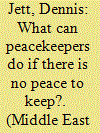| Srl | Item |
| 1 |
ID:
121504


|
|
|
| 2 |
ID:
136196


|
|
|
| 3 |
ID:
136197


|
|
|
|
|
| Summary/Abstract |
In Washington, the road from legislative intent to policy implementation is paved with politics. As a result, where that road leads often has little to do with where it was meant to go. Take the Export Administration Act, for example. One of its provisions requires the secretary of state to maintain a list of countries that are state sponsors of terrorism so that sanctions can be applied to them. State sponsors are defined as those countries that have repeatedly provided support for acts of international terrorism.1 This sounds straightforward, but the way the requirement has been implemented has left countries on the list that should be off and others off that should be on. And in every case it seems politics is the determining factor.
|
|
|
|
|
|
|
|
|
|
|
|
|
|
|
|
| 4 |
ID:
104209


|
|
|
| 5 |
ID:
149126


|
|
|
|
|
| Summary/Abstract |
They have a combined annual cost of $700 million, have been around for decades, are staffed by 14,000 soldiers and civilians and today do not seem to be accomplishing much of anything. What are they? The four peacekeeping operations (PKOs) in and around Israel. Put another way, why do all four of these operations continue to exist if there is currently so little peace to keep? There are a number of reasons for this paradox of peacekeeping, and an explanation requires taking a look at each of the four PKOs: the UN Truce Supervision Organization (UNTSO), the UN Disengagement Observer Force (UNDOF), the UN Interim Force in Lebanon (UNIFIL) and the Multilateral Force and Observers (MFO), which is not a UN operation.
|
|
|
|
|
|
|
|
|
|
|
|
|
|
|
|
| 6 |
ID:
167914


|
|
|
|
|
| Summary/Abstract |
There are 14 UN peace operations underway around the world, employing almost 100,000 soldiers, policemen and civilians at an annual cost of nearly $7 billion. Since it began its first peacekeeping efforts in 1948, the UN has launched over 70 such missions. Peacekeeping, and the wars it is supposed to help end, have evolved over that time. The earliest efforts concerned wars between countries over territory and were operations with straightforward goals. As peacekeeping became applied to civil wars, the objectives became complex and much more difficult. The most recent missions have had to deal with violent extremism, and that has made it impossible for the peacekeepers to succeed. The result is that peacekeeping today makes little contribution to peace and the peacekeepers have become ineffective and increasingly victims of the conflicts with which they have been asked to deal. To put it somewhat metaphorically, peacekeeping is a bandage and not a cure. It can help stop the bleeding, but it cannot heal the wound. To explain why that is the case requires tracing the changes in warfare and describing what the peacekeepers are asked to do as opposed to what they are capable of doing.
|
|
|
|
|
|
|
|
|
|
|
|
|
|
|
|